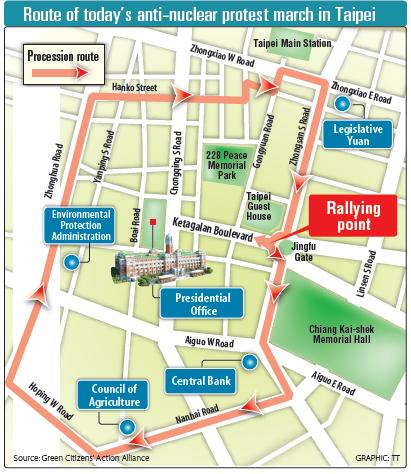The Taiwan Environmental Protection Union yesterday criticized the Chinese Nationalist Party’s (KMT) question for a proposed referendum on halting the construction of the Fourth Nuclear Power Plant, saying the text showed that the party was exploiting the shortcomings of the Referendum Act (公民投票法) to ensure construction continues.
The wording of the proposal, which was unveiled on Thursday, says: “Do you agree that the construction of the Fourth Nuclear Power Plant should be halted and that it not become operational?” (你是否同意核四廠停止興建不得運轉).
National Taiwan University professor Shih Hsin-min (施信民) said yesterday that the ruling party is trying to use the requirement that states that at least 50 percent of voters must submit ballots for a referendum to be valid to veto the proposal to halt construction of the nuclear power plant.

“They [the KMT] were really wearing their hearts on their sleeves — which say: ‘Let the construction continue,’” said Shih, who is also the president of the Taiwan Environmental Protection Union.
He said the government has always supported the construction of the power plant ever since it decided to resume the project on Feb. 14, 2001, adding that position has recently been reiterated by both President Ma Ying-jeou (馬英九) and Premier Jiang Yi-huah (江宜樺).
“They should ask if the public agree that construction of the Fourth Nuclear Power Plant be continued and that it become operational,” Shih said. “That would be a real referendum on government policy.”
Lai Chen-chang (賴振昌), president of the National Taipei College of Business, said the nation would pay a heavy price if a nuclear disaster strikes, no matter how low the chances of it happening. He said not only this generation, but the next, would continue to pay the price, adding citing the example of the Chernobyl nuclear disaster.
“An incorrect government policy is worse than a corrupt government,” Lai said. “The Ma administration has tried to explain its policy by pointing out the costs, but it has ignored the costs that the nation would have to pay for a nuclear disaster.”
National Taipei University economics professor Wang To-far (王塗發) said that the KMT’s proposal completely downplays the negatives of nuclear energy.
“What we are facing is an evil, cold-blooded and shameless government,” Wang said. “They said what happened at [the] Fukushima [Dai-ichi nuclear power plant in Japan in 2011] was mainly the result of human error, as if we are running safe nuclear power plants. Haven’t we learned the lesson of Fukushima?”
National Chiao Tung University civil engineering professor Liou Gin-show (劉俊秀) said that those living within a 30km radius of the Fukushima Dai-ichi nuclear power plant had to evacuate after the nuclear accident there. Were the same rule to apply here, 7 million people would have to be evacuated in the event of a disaster, he said.
“The rule here is 8km. Can they even do that?” Liou asked.
With anti-nuclear protest marches due to take place nationwide today, the union said more academics should come out and support the cause.
According to the Green Citizens’ Action Alliance, the civic group that initiated today’s protests, more than 22,000 people have sent text messages endorsing the movement to abolish nuclear power and it estimated that the march in Taipei would draw more than 30,000 people.
Additional reporting by CNA

Taiwan has received more than US$70 million in royalties as of the end of last year from developing the F-16V jet as countries worldwide purchase or upgrade to this popular model, government and military officials said on Saturday. Taiwan funded the development of the F-16V jet and ended up the sole investor as other countries withdrew from the program. Now the F-16V is increasingly popular and countries must pay Taiwan a percentage in royalties when they purchase new F-16V aircraft or upgrade older F-16 models. The next five years are expected to be the peak for these royalties, with Taiwan potentially earning

STAY IN YOUR LANE: As the US and Israel attack Iran, the ministry has warned China not to overstep by including Taiwanese citizens in its evacuation orders The Ministry of Foreign Affairs (MOFA) yesterday rebuked a statement by China’s embassy in Israel that it would evacuate Taiwanese holders of Chinese travel documents from Israel amid the latter’s escalating conflict with Iran. Tensions have risen across the Middle East in the wake of US and Israeli airstrikes on Iran beginning Saturday. China subsequently issued an evacuation notice for its citizens. In a news release, the Chinese embassy in Israel said holders of “Taiwan compatriot permits (台胞證)” issued to Taiwanese nationals by Chinese authorities for travel to China — could register for evacuation to Egypt. In Taipei, the ministry yesterday said Taiwan

Taiwan is awaiting official notification from the US regarding the status of the Agreement on Reciprocal Trade (ART) after the US Supreme Court ruled US President Donald Trump's global tariffs unconstitutional. Speaking to reporters before a legislative hearing today, Premier Cho Jung-tai (卓榮泰) said that Taiwan's negotiation team remains focused on ensuring that the bilateral trade deal remains intact despite the legal challenge to Trump's tariff policy. "The US has pledged to notify its trade partners once the subsequent administrative and legal processes are finalized, and that certainly includes Taiwan," Cho said when asked about opposition parties’ doubts that the ART was

If China chose to invade Taiwan tomorrow, it would only have to sever three undersea fiber-optic cable clusters to cause a data blackout, Jason Hsu (許毓仁), a senior fellow at the Hudson Institute and former Chinese Nationalist Party (KMT) legislator, told a US security panel yesterday. In a Taiwan contingency, cable disruption would be one of the earliest preinvasion actions and the signal that escalation had begun, he said, adding that Taiwan’s current cable repair capabilities are insufficient. The US-China Economic and Security Review Commission (USCC) yesterday held a hearing on US-China Competition Under the Sea, with Hsu speaking on